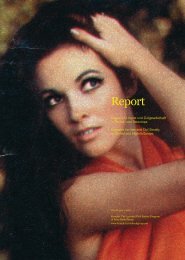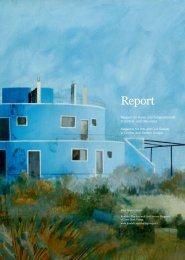Report_Issue 1/2009 - Jubiläum/ 20 Jahre Mauerfall
Report_Issue 1/2009 - Jubiläum/ 20 Jahre Mauerfall
Report_Issue 1/2009 - Jubiläum/ 20 Jahre Mauerfall
Erfolgreiche ePaper selbst erstellen
Machen Sie aus Ihren PDF Publikationen ein blätterbares Flipbook mit unserer einzigartigen Google optimierten e-Paper Software.
Homesick<br />
IS NO BORDER, NO BORDER, NO BORDER, I WISH.”<br />
— Antje Mayer talks to Šejla Kamerić —<br />
The work of the young Bosnian artist Šejla<br />
Kamerić (who was born in 1976) is closely connected<br />
with the siege of Sarajevo (1992–1996).<br />
She experienced the three-and-a-half-year<br />
long siege of her hometown together with<br />
her family, and her father was killed in the<br />
war. This period exerted a great influence<br />
on her as an artist: “Even though now I deal<br />
with a number of very different themes,” says<br />
Kamerić, “the war will always remain a part of<br />
me.” Her best-known work: the photomontage<br />
“Bosnian Girl” (<strong>20</strong>03) – which is part of the art<br />
collection of the Erste Group shows herself as<br />
a model, above a piece of graffiti that a Dutch<br />
soldier smeared on the wall of a military barracks<br />
in Srebenica: “No teeth …? A mustache<br />
…? Smel like shit …? Bosnian girl!” She talked<br />
to “<strong>Report</strong>” about such basic feelings as homesickness,<br />
freedom and fear as a European<br />
Bosnian woman.<br />
Antje Mayer: One of your projects is a sticker with a large arrow and the<br />
words “SARAJEVO homeSICK”. You had stuck them wherever you happened<br />
to find yourself. Do you really feel homesick so often?<br />
Šejla Kamerić: I once met a curator who confessed to me that he had<br />
never in his life experienced the feeling of homesickness. I then said to<br />
him: “But that means that you have never in your life felt really at home<br />
anywhere.” He admitted that this was true. For me, home is not inevitably<br />
connected with a place, it is wherever I feel safe and well. Sarajevo,<br />
the town where I was born, is one such place but I mean that less in<br />
a geographical and more in a mental sense. As an artist I have reconstructed<br />
this city as a symbol. My work commemorates the many people<br />
who were forced to flee or emigrate and now must learn to live with this<br />
“sickness”. They are forced to recreate their native city Sarajevo or home.<br />
This is what the homeSICK is about.<br />
Is homesickness not also a beautifully melancholic feeling? For me, the<br />
German word “Heimweh” (literally home-ache) expresses that far better<br />
than the English word “homesick”.<br />
Yes indeed, it can be very pleasant to feel homesick, for this means that<br />
there is a home somewhere that you can long for. But it can also make<br />
you truly ill. If you are unable to get to this “home” or you do not have a<br />
“home”, it can be associated with great sorrow and suffering.<br />
“Don’t forget that we Bosnians are not<br />
citizens and our freedom is very different<br />
to that of EU citizens.”<br />
When I lived abroad there were times when I felt sorry for myself, it<br />
seemed to me that I had been terribly amputated, as it were, because I<br />
could not converse in my most fundamental way, in my native language.<br />
Is language not also home in some way or other?<br />
Language can be home in one way but I don’t believe we should build our<br />
home in the language. Vienna and Sarajevo are small cities where this is<br />
relevant perhaps, but in large cities, say like New York, the term “native<br />
language” loses its meaning because almost everyone is a foreigner there<br />
and English is a foreign language to many. People create their own communities<br />
where they can communicate.<br />
Is the feeling of homesickness not threatened with extinction in a world<br />
in which, via Internet, one can be present in many places, at least virtually?<br />
A world where, for instance through the Internet program Skype,<br />
we can talk to each other in real time and where everyone can afford air<br />
travel?<br />
This makes it easier. But isn’t it rather like a big supermarket with a huge<br />
range of goods in which one is likely to get lost, while one still cannot<br />
find the thing one is looking for, a home? Don’t forget that we Bosnians<br />
are not EU citizens and our freedom is very different to that of EU citizens.<br />
As a well-known Bosnian artist I am privileged, I have a Schengen<br />
visa. But other people have to pay a lot of money, deal with an incredible<br />
amount of paperwork and accept all kinds of indignities in order to be<br />
able to leave the country. A young Bosnian student cannot simply pack<br />
his rucksack and go on interrail in order to explore the world. This is<br />
a major problem for my country. The young people have never experienced<br />
Bosnia-Herzegovina as a prosperous country; all they have ever<br />
known is war or the post-war period. How should such young people be<br />
able to see that things can be different? Where can they find hope that<br />
something can be changed, that something can be started in our country?<br />
It is the same with Internet, low faire air travel or radio signals. Not<br />
all people have the same access.<br />
In your work “EU/Others” at the Manifesta3 in Ljubljana (<strong>20</strong>00) you<br />
built up two entrances like in an airport, one for “European Citizens”,<br />
one for the “Others”. As a Bosnian, isn’t it true that you associate different<br />
things with the terms “EU” and “Europe” than I do?<br />
For me, the EU is primarily a political and economic community that attracts<br />
people because one can move freely across it without the obstruction<br />
of borders. I fear, however, that the more it grows the more it will<br />
exclude people and restrict diversity. At the moment we Bosnians experience<br />
the EU as rejects, so to speak, who have been shifted to the edge of<br />
this empire. Europe? My family and I have always regarded ourselves as<br />
Europeans. But European policy during the siege of Sarajevo and the war<br />
made it painfully clear to us all in BH that apparently we are not.<br />
During the 43-month siege of Sarajevo you stayed in the city. When the<br />
horrors began you were 16, when they ended, just <strong>20</strong>. Many of your contemporaries<br />
fled the city at the time. There was a number of opportunities<br />
to do this. Why did you take it upon yourself to stay?<br />
Before the war my parents, my sister and I had discussed whether we<br />
should flee and we decided to stay. When someone tries to force you to<br />
leave your home because they maintain it is not your native country, this<br />
only strengthens your determination to stay. After my father was killed<br />
I was more certain than ever. I am firmly convinced that Sarajevo has<br />
benefited from my presence there as an artist.<br />
Would you say that because of this decision you were able to preserve<br />
your inner freedom, even though externally it was restricted in the most<br />
brutal way by the Serbian siege?<br />
Exactly. In the work “FREI” from <strong>20</strong>04, I dealt with the theme of freedom.<br />
I had made a stamp with the word “free“, in the course of time the<br />
word faded and it finally vanished completely. I wanted to express the<br />
fact that freedom is something relative, not absolute. It is not a permanent<br />
feeling but something that comes and goes.<br />
Do you have the impression that I am freer than you because I am an EU<br />
citizen?<br />
No, although I don’t have the same freedom as you, to move around and<br />
to consume without restrictions – which is what is generally defined as<br />
freedom – I have different freedoms. There are innumerable feelings of<br />
freedom. When I lived in Vienna, I regarded the fact that, due to the complaints<br />
of the neighbours, I was not able to take a shower late at night as<br />
a lack of freedom. After the war one friend of mine said that if we had<br />
not survived the war, we would not know what it means to be free and<br />
happy. In one perverse way, the war also had something positive about<br />
it. In a different way one became richer and wiser. Freedom has so many<br />
different faces.<br />
Šejla Kamerić was born in Sarajevo (Bosnia and Herzegovina) in 1976. She completed<br />
her studies at the Academy of Fine Arts in Sarajevo, Department of Graphic Design,<br />
and worked as Art Director in the creative team “Fabrika” in Sarajevo. In 1997 she<br />
made her debut as an artist at SCCA’s (Sarajevo Centre for Contemporary Art) first annual<br />
exhibition “Meeting Point”, which presented her public installation “Copy-Paste”.<br />
Public interventions, diverse types of actions and site-specific installations are among<br />
the most important aspects of her approach to art (“EU/Others”, “Fortune Teller”).<br />
Moreover, she uses photography and video as media to juxtapose an explicit social<br />
context with intimate perspectives (“Basics”, “Bosnian Girl”, “Dreamhouse”).<br />
In addition to participating in numerous group exhibitions at home and abroad, her<br />
most recent solo exhibitions (<strong>20</strong>08) were: “Šejla Kamerić”, Galerie im Taxispalais,<br />
Innsbruck (A), curated by Silvia Eiblmayr, “Particle or more”, Moria Gallery, Hvar (HR),<br />
“Is it rain or is it a hurricane”, Emil Filla Gallery, Ústí nad Labem (CZ), curated by Michal<br />
Kolecek, “What Do I Know”, DAAD Gallery, Berlin (GER). She lives and works in<br />
Sarajevo and Berlin.<br />
www.sejlakameric.com<br />
www.kontakt-collection.net<br />
Published in “<strong>Report</strong>” in September <strong>20</strong>06 (online)<br />
39




